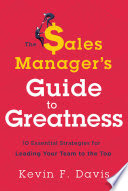Increase Sales: Train Sales Managers

Every year sales superstars are promoted to sales manager and fail. Why do top performing sales people struggle as sales managers? The most common reason is a skills gap. The book: The Sales Managers Guide to Greatness author Kevin Davis helps close those all too common skills gaps and teaches sales managers to lead sales teams strategically with his 10 essential strategies for leading your team to the top.
I have seen this happen for over 34 years now….
Mike was a top performing sales rep for the company years ago. He met his sales growth goals and often exceeded his gross profit metric. His customer satisfaction scores were the best in the company and he executed the top new product placement in the entire sales organization. About 18 months ago Mike was promoted to sales manager and now we need to discuss the poor results of his sales team and develop a corrective action plan.
What happened to Mike? …(the senior leadership team asks)…he was once our best rep and now his region is failing? Is he just not motivated anymore?
From my experience his motivation is not the problem….
Mike was your sales super star and one day someone in management, (probably in a meeting about some other sales topic) says: “ What we need are a team of Mike’s, look at his results! What if we promote Mike and create an entire team if Mike’s?”
Mike’s manager meets with him and shares the exciting news and Mike is promoted to sales manager.
When can I start?… he asks.
His manager shares: Immediately, and we will need you to watch over your accounts until we hire your replacement.
Mike hits the road and starts traveling and meeting his teams’ customers while watching over his customers. His team was recently peers, buddies even, but now they are treating him differently after all he is management now. He assumes this must be one of the prices you pay to be a sales manager and presses on. He feels somewhat alone and misses the relationships he one had.
He finds many of his sales reps have good relationships with customers but lack sales skills training and are not following the companies’ sales process so he jumps in to help close more sales.
Fast forward…18 months pass and now Mike is meeting with someone like me to help turnaround his team’s sales results. Mike is exhausted, he has been traveling and having four legged sales calls with his sales reps five days a week. He is working nights and weekends just to keep up. His team is now at 75% of plan and everyone in senior leadership is concerned and they want his team back on track ASAP.
Eight months ago his VP of sales put Mike on performance improvement plan and part of that plan is a weekly report of activity and results by day. Mike shares how one of the things he loved about being a sales rep was setting his own schedule and now he feels he is being micro managed. He goes on to share he quit his morning workouts, has gained 15 pounds and his relationship with his wife and children is strained since taking this position.
One of few things typically happens with “Mike’s” …
They leave your company and join your competitor’s team and quickly become your competitors’ top performing sales rep.
They stay and move into survival mode, they often fail and are asked to take a sales rep role again but are never as effective as they once were, or they are asked to leave the team.
They find someone who will train, coach and mentor them and over time they develop into the top performing sales manager.
Why does this happen to once top performing sales reps when they enter sales management?
A quick answer as I have shared before is a skills gap.
The skills required to lead a sales team are much different than the skills to be a sales representative.
To be an effective salesperson you need the following skills:
- Prospecting
- Questioning and Qualifying
- Listening
- Strong communication skills
- Time management
- Product knowledge
What skills are required to be an effective sales manager?
- Setting goals and objectives
- Recruiting and hiring
- Coaching
- Sales Performance Management
- Leadership
- Team time management
- Industry/Market knowledge
I was very excited to receive a signed copy of Kevin Davis’s new book: The Sales Managers Guide to Greatness. I love to read and learn so I was curious about this new book and would it help the fix sales management problems?
I found this book an excellent tool to give all sales managers to help them better understand how to drive profitable sales results with a sales team. Kevin does an excellent job of discussing the skills gap between being a sales person and a sales manager.
For example the author boldly challenges the myths many believe to be true about what it takes to be a sale manager.
This book shares what it takes to be a top performing sales manager but it also includes specific action plans one can take to improve.
For example the author shares how the role of the sales manager has needed to evolve just as the role of salespeople has evolved based on the changing behaviors of buyers.
One skill that every sales manager must posses is that of a sales coach and rarely is it taught. In this book the author shares how critical sales coaching is to drive team and individual performance.
In chapter three the author shares his very specific coaching model:
C – Commitment
O – Observe
A – Assess
C- Consult
H– Help
He walks you through each step and how to apply them.
If you were recently promoted to sales manager I highly recommend you buy this book and read it.
If you are a leader in your company and recently promoted a top performing sales super star into sales manager, please buy them this book.
If your team has a few “mikes” struggling as sales managers, buy them this book and coach them.
Sales manager skills gap
How about your team….
Have you recently promoted a top performing sales person to sales manager? (How’s that working?)
Does your company train recently promoted salespeople? What training program do you use?
Can your team afford to have one or more of your sales territories performing at 75% to plan?
Top performing sales reps can become market leading sales managers if trained. The Sales Manager’s Guide to Greatness helps close the skills gaps for sales people wanting to be strong sales managers. In The Sales Manager’s Guide to Greatness, sales management consultant Kevin F. Davis offers 10 proven and distinctly practical strategies, skills, and tools for overcoming the most challenging obstacles sales managers face


